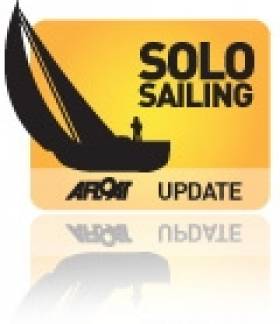Displaying items by tag: Mini 650
National Yacht Club Offshore Sailor Launches Mini 650 Campaign with 2023 Transat Ambition
With a target of this season's 220 nautical mile French Solo Trophée Map race, Dublin Bay offshore sailor Mark O'Connor has launched a Mini 650 campaign.
The 23-year-old UCD engineering student has entry into the 2023 Mini Transat as the main aim of his solo move.
A regular crewman racing on Chris Power Smith's J122 Aurelia in the ISORA Series, O'Connor learned to sail in the National Yacht Club junior section where is he is now an active member of the East Pier club's U25 section.
 Mark O'Connor's boat is a Pogo 2 type Mini 650, hull number 840 that is now on the water in Dublin Bay
Mark O'Connor's boat is a Pogo 2 type Mini 650, hull number 840 that is now on the water in Dublin Bay
O'Connor's boat is an American built Pogo 2 type Mini 650, hull number 840. It was purchased in Barcelona and transported to France before travelling by ferry to Dublin.
O'Connor plans to work on 'learning the boat' and how to sail it, before competing in the mini regatta series with the aim of qualifying for the Mini Transat.
 The new NYC-based Mini 650 on her way to Dublin
The new NYC-based Mini 650 on her way to Dublin
Helicopter Salvages Yacht off Beach
#solosailing – It seems there's nothing a helicopter can't handle in terms of recovery, even in a worst case scenario like the one above.This successful salvage lift of a Pogo 2 Mini 6.50 was completed at Bovisands beach on the east side of Plymouth Sound in Devon, England. That's a 430 kilogram keel too!
























































